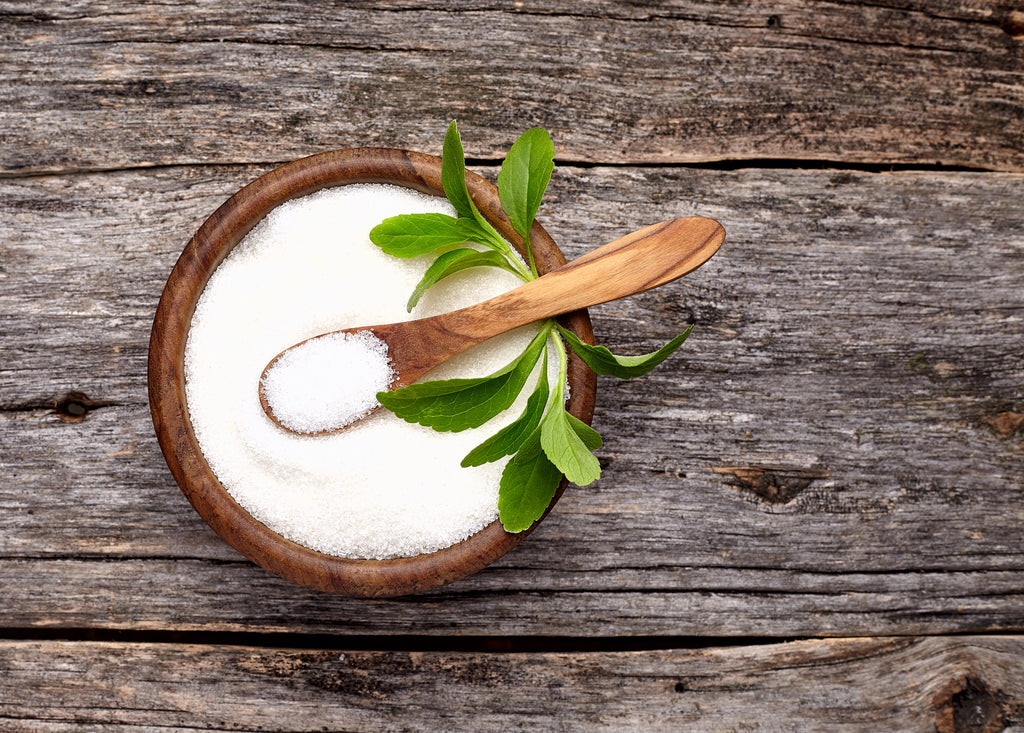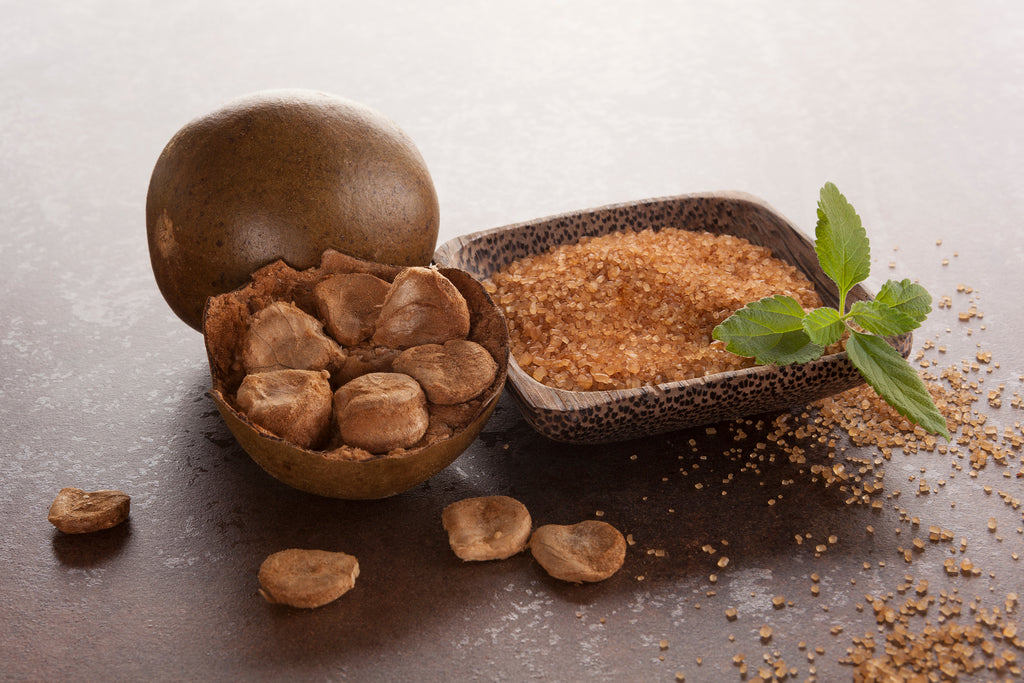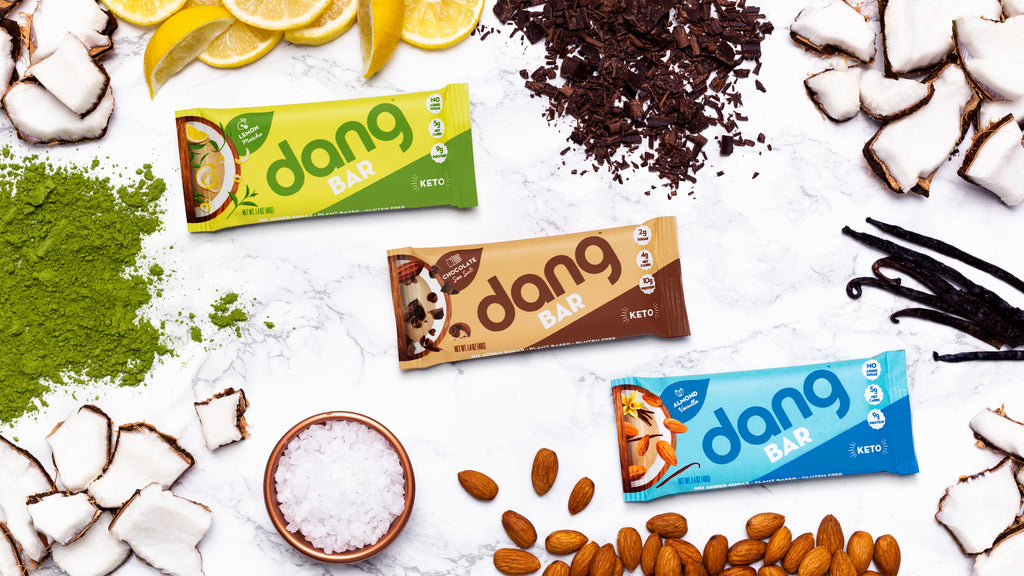There it is again, that nagging sweet tooth. No matter how focused your wellness routine may be, for some that craving is hard to ignore. It’s a battle between what we want and what we know—and we know that eating too much sugar can lead us down a path of weight gain, inflammation, and more serious issues.
Thankfully, you don’t have to give it up cold turkey. There’s a wide array of alternatives to traditional refined sugar, many of which have abundant sources of natural sweetness and have been used for centuries. (Hello, stevia and monk fruit!) But how do you determine which is right for you?
Here, we’ve rounded up 8 of the most common options—Keto and paleo friendly ones too!—to help you better navigate the grocery shelves and better serve your body:

STEVIA
Derived from the stevia rebaudiana plant common to Central and South America, this zero-calorie sweetener (pictured above) is made of sweetening compounds called steviol glycosides, including Rebaudioside-A (Reb-A), which can be 250 to 300 times sweeter than sucrose (the main component of cane sugar). It comes with various stamps of approval—from the FDA calling glycosides like Reb-A “generally recognized as safe” (GRAS) to the fact that stevia doesn’t spike insulin levels and has been approved by food advocacy groups. And gone are the days of stevia’s unappetizing flavor; its improved profile is much more neutral. That’s why we use this particular sweetener for Dang Bars. Since it packs a sweeter punch, we use just the smallest amount to achieve the best flavor.
ALLULOSE
If you follow a Keto friendly diet, chances are you’ve heard of this low calorie sweetener. Found naturally in foods like figs, jackfruit, and raisins, allulose has the taste, texture, and chemical composition of sugar with a fraction of the calories. There’s evidence linking allulose to lowering insulin and glucose levels, but there are some conflicting reports about how it can affect your gut microbiome.
AGAVE (NOT KETO-FRIENDLY)
Agave plants don’t just provide the base ingredient to tequila. These plants, found mostly in the U.S. Southwest, Mexico, and South America, can also make agave syrup, a sweetener frequently used in beverages and baked goods. It ranks pretty low on the glycemic index (a numerical measure of how foods affect blood-insulin levels; the higher the number, the more it'll cause a spike) but it’s also higher in fructose—more fructose than high-fructose corn syrup in fact. And since fructose is processed by the liver (and not absorbed into the bloodstream), there have been links between excessive fructose consumption and liver damage as well as other health issues.
HONEY (NOT KETO-FRIENDLY)
There’s a lot to love about honey. It has naturally occurring vitamins and antioxidants. It seems like the perfect complement to those summer acai bowls. But honey also clocks in higher on the glycemic index and has more calories per teaspoon than table sugar. Some don’t love the distinct taste, which makes for a difficult 1:1 match.
MAPLE SYRUP (NOT KETO-FRIENDLY)
Think of honey and maple syrup—sourced from the boiled sap of maple trees—as sweet, oozy cousins, rather than siblings. Like honey, it has a similar number of calories per serving, comes with nutrients (zinc, riboflavin, manganese), and is made mostly of fructose. But it reads lower on the glycemic index than honey.

MONK FRUIT
With a history that dates back to 13th century Buddhist monks, this fruit (above) grows in China and Thailand and is available in the U.S. in dried and powdered forms. Studies have shown that the sweetener extracted from the fruit doesn’t affect insulin or glucose levels—it touts zero calories and is 10-250 times sweeter than table sugar—but watch out for some formulas mixed with honey or molasses. Like allulose, it’s newer on the scene, so there are fewer studied side effects. It can also be a pricier option, thanks to the labor-intense growing and drying process, as well as the cost of importing the fruit.
COCONUT SUGAR (NOT KETO-FRIENDLY)
Though it’s similar in calories to cane sugar, this less processed sugar is pulled from the sap of coconut palm trees and its claims to fame are minerals like iron, magnesium and potassium to keep energy levels balanced, plus mood-boosting vitamin B. Coconut sugar is a paleo friendly choice loved for its brown sugar-like flavor, which is why we picked it for our Caramel Sea Salt Coconut Chips and Coconut Crunch Sticky-Rice Chips—just the smallest amount to give it a a slightly sweet taste.
SUGAR ALCOHOLS
You may have seen ingredients like sorbitol and maltitol on packaging. These sugar alcohols are found naturally in certain fruits and veggies (like pineapples, sweet potatoes and seaweed), have fewer calories per gram that table sugar, and don’t interact with plaque bacteria, which means it doesn’t lead to cavities. The big caveat is that sugar alcohols have been linked to digestive issues—think bloating, gas, and diarrhea if eaten in excess—and can disrupt glucose levels.

WHY WE MAKE OUR DANG BARS WITH STEVIA
When it came to formulating a recipe for Dang Bars we knew it had to be Keto friendly, plant based and sweetened naturally with ingredients that wouldn't spike insulin levels—like honey, maple syrup, agave or regular sugar do—or cause the digestive issues associated with sugar alcohols. But we were picky about the flavor, too. That's why we went with the mild, FDA-approved stevia, which has been studied far more extensively than many other natural options on the scene. Since it's sweeter than refined sugar, the little we use in each bar goes a long way, letting the whole food ingredients like almonds and coconuts shine. It's a simple swap if you're looking to consume less sugar.
We call that the ultimate sweet spot.












